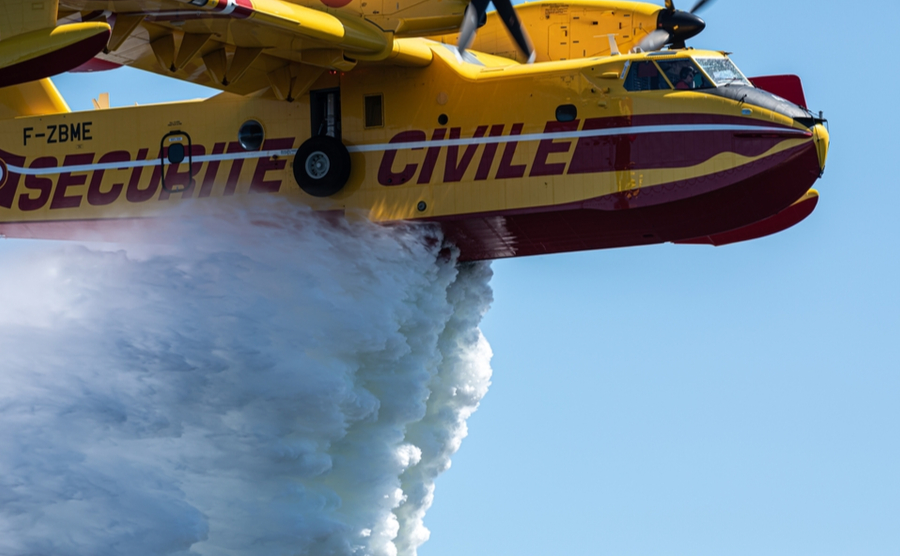With much of Europe enduring extremely hot temperatures recently, we look at how France has fared and kept its wildfires under control.
Wildfires have been very much in the news in many parts of the world. France is no stranger to wildfires, particularly at this time of the year when so often there are drought-like conditions coupled with strong winds. However, this year is currently seeing extremely hot temperatures and due to this and other factors such as climate change and little rain, the risk of wildfires seems to have increased.
As I write, four departments in the south have been put on red alert – the highest category. These are: Drôme, Ardèche, Rhône and Haute-Loire. Fifteen more departments will be added by Tuesday evening. In the Var department some forests have been declared off limits to lessen the risk of forest fires. Generally speaking, a red level alert means the heatwave plan is at its highest possible level.

A water bomber in Bordeaux last year (Nikolay Gyngazov, Irma07)
Last year there were droughts in many parts of the country meaning that vast areas of forest and woodland were at some risk from random fires. This year there has been much of the same but with fires starting earlier in the year than before . As a result of this, the French government has been vocal in its plea to home owners to keep their trees thin and chopped and to be extra vigilant regarding cigarettes, barbeques and any other fire risks.
Find homes in France via our property portal.
France’s forest fire control
So how does France cope with the fires and are they being successfully contained?
As well as the plea from the government asking for extreme vigilance from property owners, there is a legal statute in place which is designed to avoid as many fire risks as possible. French law states that there is an obligation on property owners in many parts of the country, mainly in the south, to maintain their gardens and grounds.
The law has three policy objectives: protection against wildfires, of the environment and public health and safety. The so called “code forestier” says that property owners in 31 departments are obliged to control brushwood and general undergrowth in order to minimise the risk of wildfires breaking out. The French word for this is “debroussaillement”. Owners of land which lies less than 200 metres from woodland or moors are legally obliged to limit any risk of fire by clearing and cutting any undergrowth within 50 metres of their property. If this is not done, a fine can be imposed.
All wildfires are taken extremely seriously in France. Fire fighters from various local villages and towns are all employed as soon as a fire is reported. In addition to tackling fires on the ground, small planes are used overhead which can spray water bombs over a huge area. After the droughts and fires of last year, President Macron announced that by the end of his presidential term in 2027, France will have increased the number of Canadair planes (originally produced in the 1960s, these planes were designed for fighting huge fires in rural Canada) and also will acquire 2 helicopters.
There is also a freephone number 0800 06 66 66 which is activated during intense heatwaves and alerts emergency services to elderly and vulnerable people who are the most at risk generally from the heat. The health minister has announced that the current heatwave looks as though it will be one of the hottest on record. He also reassured people that local health agencies are aware of the situation and that protecting the more vulnerable is paramount.
The heat dome
The last extremely intense heatwave in France was in 2003 when several people lost their lives. Since then, local authorities have been obliged to put emergency plans in place and this of course goes for tackling wildfires which may result from the intense heat.
The recent fires close to Argeles sur Mer, near the Spanish border, have caused some devastation to homes although no-one was injured or killed. The fires destroyed approximately 500 hectares (1,240 acres) of land and a campsite where over 2,000 people were evacuated before the blaze was brought under control. There has been what is called a “heat dome” spreading across the greater part of France which appears to have caused these latest fires.
Climate change has undoubtedly had a detrimental effect on the weather generally across the planet. The French environment minister announced that the climate crisis has exacerbated the conditions of drought which have led to the fires. This is no doubt true in many other parts of the world also. In Europe, Spain, Italy and Greece have all suffered extreme temperatures and fires in recent weeks. The USA has also seen extreme temperatures and fires, particularly on the west coast. Maui in Hawaii is still suffering from extensive fires.
So far so good in 2023
Fortunately this latest fire in the south of France was fairly quickly contained but local fire fighters are taking no chances and are still working to completely extinguish any remnants of the fire. The area is under constant surveillance, particularly in the light of the current very high temperatures.
The weather in the greater part of the south of France remains extremely hot with temperatures in excess of 40 degrees during the last few days. With hot air blowing north from the Sahara, the heat is such that everyone needs to be extra vigilant.
Clearly the problem of wildfires is an ongoing one but France has some of the best infrastructure in the world for dealing with wildfires and is very well equipped for tackling every blaze very quickly.










